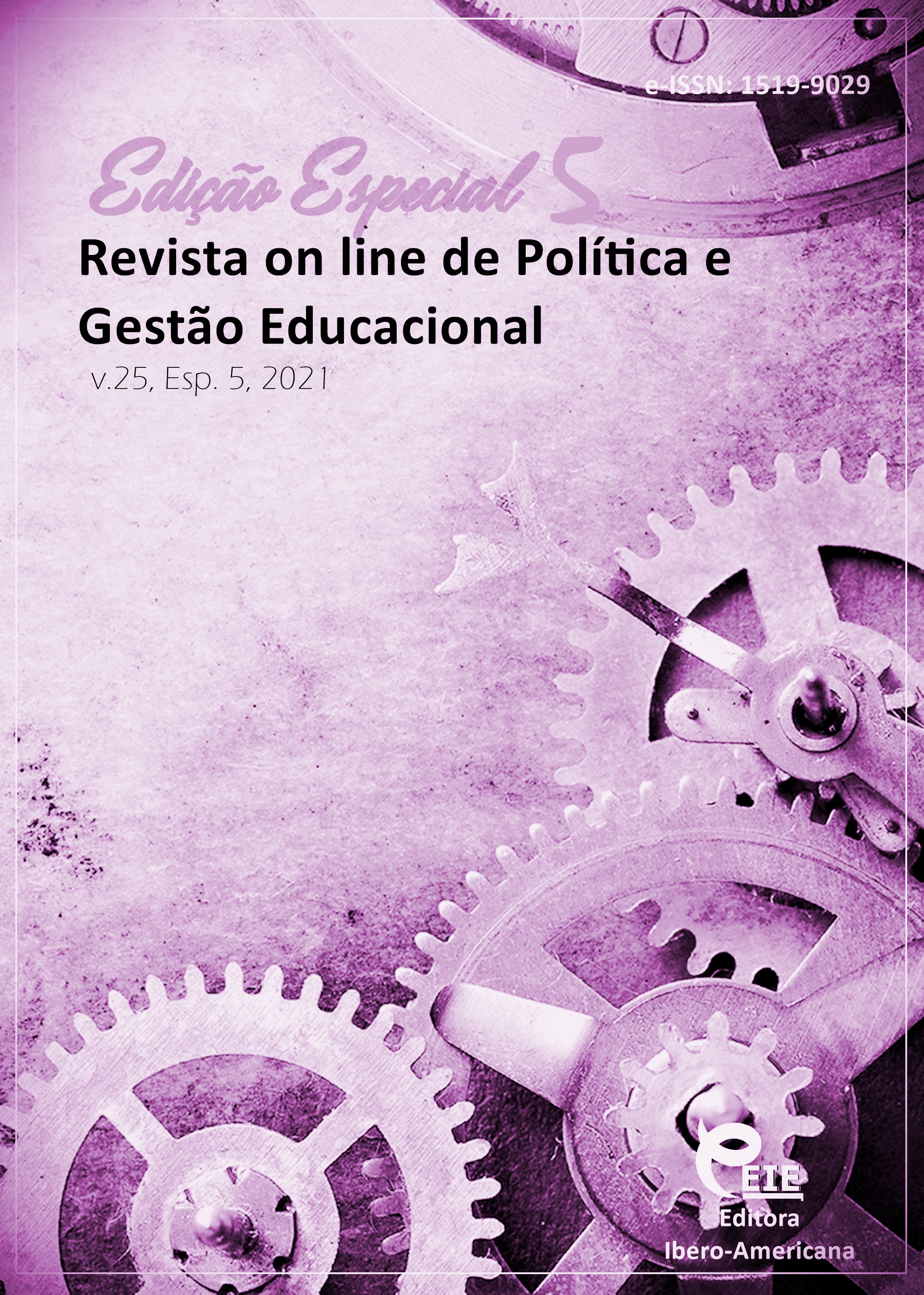Educação pedagógica moderna nas condições de aprendizagem mista
Experiência estrangeira
DOI:
https://doi.org/10.22633/rpge.v25iesp.5.16042Palavras-chave:
Educação pedagógica, Blended learning, Tecnologias a distância, InternacionalizaçãoResumo
O presente estudo é teórico e visa explorar e avaliar criticamente a experiência de aprendizagem mista demonstrada por países do mundo que alcançaram um alto nível de educação. Usando um complexo de métodos teóricos, o estudo fornece uma análise do conceito de aprendizagem mista, que combina as formas tradicionais de educação, os métodos de ensino a distância e tecnologias inovadoras de e-learning. Os modelos de aprendizagem mista considerados mais bem-sucedidos na implementação prática são analisados. Os exemplos fornecidos e recomendações para organizar a aprendizagem combinada na educação pedagógica em países estrangeiros e uma discussão dos desafios de sua implementação e as possibilidades de superá-los podem ser úteis no uso da aprendizagem combinada no sistema de educação russo, levando em consideração as especificidades domésticas. Os resultados do estudo sugerem que a eficácia da educação pedagógica pode ser assegurada por meio de uma implementação combinada de diferentes formas de e-learning e aprendizagem tradicional - através da aprendizagem mista.
Downloads
Referências
ABRAMOVA, Y. K. Blended learning as an innovative educational technology. Prospects for the development of information technologies, v. 17, p. 115-119, 2014.
ALAMMARY, A.; SHEARD, G.; CARBONE, A. Blended learning in higher education: three different approaches. Australasian Journal of Educational Technologies, v. 30, n. 4, p. 440-454, 2014.
BARBER, M.; MURSHED, M. How to achieve a consistently high quality of education in schools. Lessons from the analysis of the best school education systems in the world. Questions of Education, v. 3, p. 7-60, 2008.
BIELAWSKI, L.; METCALF, D. Blended eLearning: integrating knowledge, performance, support and online learning. Amherst: HRD Press, 2003.
BOGORYAD, N. V.; LYSUNETS, T. B. Changing the role of the teacher in the concept of mixed learning. In the world of scientific discoveries, v. 3, n. 51, p. 76-81, 2014.
BORISENKOV, V. P. Quality of education and problems of training of pedagogical personnel. Education and science, v. 3, n. 122, p. 4-18, 2015.
CLARC, D. Blended learning: an EIC White Paper. Brighton: Epic Group, 2003. p. 23.
DUDNEY, G.; HOCKLY, N. How to teach English with technology. Harlow: Pearson Education, 2007.
EL-MOWAFY, A.; KUHN, M.; SNOW, T. Blended learning in higher education: current and future challenges in surveying education. Issues in Educational Research, v. 23, n. 2, p. 132-150, 2013.
GOSUDAREV, I. B. On the issue of the terminology of e-learning. Human and education, v. 1, n. 42, p. 180-183, 2015.
GRACHEVA, L. Y. et al. Models and practices of professional development of teachers in foreign educational systems. Education and Science, v. 22, n. 6, p. 176-200, 2020.
INTERFAX EDUCATION. Distance learning in extreme conditions. 2020. Disponível em: https://academia.interfax.ru/ru/analytics/research/4491/. Acesso em: 10 set. 2021.
IVANOV, O. B.; IVANOVA, S. V. Formation of the educational environment: an interdisciplinary view. Philosophical Sciences, v. 1, p. 39-49, 2016.
KLEYMENOV, I. S. Practice of pedagogical education and professional development of personnel in Finland and Sweden. In: Government and law, economics and education: a youth perspective. Materials of the All-Russian student scientific and practical conference of students, undergraduates and postgraduates. Tula: Tula State University, 2019. p. 250-253.
LEGAN, M. V.; YATSEVICH, T. A. Combined model of student learning based on the distance learning system. Higher education in Russia, v. 4, p. 136-144, 2014.
MATVEEVA, E. F. Modern world trends in the system of training and advanced training of teachers in Hong Kong. Professional education in Russia and abroad, v. 2, n. 26, p. 175-180, 2017.
MEANS, B. et al. Evaluation of evidence-based practices in online learning: a meta-analysis and review of online learning studies. U.S. Department of Education, 2010.
MIJARES, I. Blended learning: are we getting the best from both worlds? Literature Review for EDST 561, 2012. DOI: http://dx.doi.org/10.14288/1.0075749
MULLER, D. The Tyranny of indicators: how the obsession with numbers threatens education, healthcare, business and power. Transl. from English. Moscow: Alpina pablisher, 2019. 266p.
POLLOCK, W. H.; JEFFERSON, A. M. Six disciplines of breakthrough training. How to turn training and development into business results. Transl. from English by Gorman, A. Moscow: Eksmo, 2019. 352p.
RICHARDS, G. Learning analitics: on the way to smart education. Moscow, October 8, 2012. Disponível em: https://slideplayer.com/slide/3740970. Acesso em: 10 set. 2020.
SHIRSHOVA, I. A. Preparation of a modern teacher: the experience of Finland in the field of pedagogical education. Scientific notes of the Tavrichesky National University named after V. I. Vernadsky. Series "Problems of pedagogy of secondary and higher schools", v. 4, p. 26-35, 2014.
SHITOVA, V. A. Problems of implementing distance learning technologies in the educational process of higher education. Bulletin of the Moscow State Regional University, v. 4, p. 57-64, 2011.
TAGUNOVA, I. A. et al. Modern pedagogical comparative studies: role, functions, and factors of development. Moscow: Novoye vremya, 2019. 208p.
ZHELNOVA, E. V. 8 stages of mixed learning: review of the article "Missed Steps" by Darlene Painter, Training & Development. 2018. Disponível em: http://www.obs.ru/interest/publ/?thread=57. Acesso em: 10 set. 2021.
Downloads
Publicado
Como Citar
Edição
Seção
Licença
Copyright (c) 2021 Revista on line de Política e Gestão Educacional

Este trabalho está licenciado sob uma licença Creative Commons Attribution-NonCommercial-ShareAlike 4.0 International License.
Manuscritos aceitos e publicados são de propriedade da Revista on line de Política e Gestão Educacional. É vedada a submissão integral ou parcial do manuscrito a qualquer outro periódico. A responsabilidade do conteúdo dos artigos é exclusiva dos autores. É vedada a tradução para outro idioma sem a autorização escrita do Editor ouvida a Comissão Editorial Científica.











